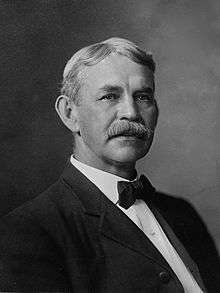Henry St. George Tucker III
Henry St. George Tucker III (April 5, 1853 – July 23, 1932) was a representative from the Commonwealth of Virginia to the United States House of Representatives, professor of law, and president of the American Bar Association.
Henry St. George Tucker III | |
|---|---|
 | |
| Member of the U.S. House of Representatives from Virginia's 10th district | |
| In office March 21, 1922 – July 23, 1932 | |
| Preceded by | Henry D. Flood |
| Succeeded by | Joel W. Flood |
| In office March 4, 1889 – March 3, 1897 | |
| Preceded by | Jacob Yost |
| Succeeded by | Jacob Yost |
| Personal details | |
| Born | Henry St. George Tucker III April 5, 1853 Winchester, Virginia, U.S. |
| Died | July 23, 1932 (aged 79) Lexington, Virginia, U.S. |
| Political party | Democratic |
| Spouse(s) | Henrietta Preston Johnson |
| Alma mater | Washington & Lee University |
| Occupation | Attorney |
Early and family life
He was born to Laura (née Powell) and John Randolph Tucker in Winchester, Virginia, and received a LL.B. from Washington and Lee University School of Law in 1876. He married Henrietta Preston Johnson in 1877, and had several children, among them John Randolph Tucker (professor). In 1898, he purchased the Col Alto estate at Lexington, Virginia.[1]
Career
Tucker was elected to the 51st Congress as a Democrat and served four terms. He thereupon returned to Washington and Lee, where he became the professor of constitutional law and equity in 1897. Three years later he was made Dean of the Law School, in 1900.
He moved to Washington, D.C. and became dean of the school of law at Columbian University (now George Washington University) from 1903 to 1905, when he became President of the Jamestown Exposition.
Tucker returned to Congress in 1922, after a hiatus of nearly 25 years, when he was elected to the 67th Congress upon the death of Henry D. Flood in 1921. He was re-elected several times, serving until his own death in 1932.
Works
- Tucker, Henry St. George III (2003). Woman's suffrage by constitutional amendment. Clark, N.J. : Lawbook Exchange, 2003; Originally published: New Haven : Yale University Press, 1916, in series: Storrs lectures. ISBN 1-58477-342-1.
- Tucker, Henry St. George III (2000). Limitations on the treaty-making power under the Constitution of the United States. Union, N.J. : Lawbook Exchange, 2000; Originally published: Boston : Little, Brown, 1915. ISBN 1-58477-015-5.
- Tucker, John Randolph (1981). The Constitution of the United States : a critical discussion of its genesis, development, and interpretation; edited by Henry St. George Tucker. Littleton, Colo. : F.B. Rothman, 1981; Reprint. Originally published: Chicago : Callaghan, 1899. ISBN 0-8377-1206-8.
See also
- List of United States Congress members who died in office (1900–49)
References
- Calder Loth and John Salmon (August 1988). "National Register of Historic Places Inventory/Nomination: Col Alto" (PDF). Virginia Department of Historic Resources.
External links
- United States Congress. "Henry St. George Tucker III (id: T000399)". Biographical Directory of the United States Congress.
| U.S. House of Representatives | ||
|---|---|---|
| Preceded by Jacob Yost |
Member of the U.S. House of Representatives from Virginia's 10th congressional district 1889–1897 |
Succeeded by Jacob Yost |
| Preceded by Henry D. Flood |
Member of the U.S. House of Representatives from Virginia's 10th congressional district 1922–1932 |
Succeeded by Joel W. Flood |
| Academic offices | ||
| Preceded by William Lyne Wilson |
President of Washington and Lee University 1900—1901 |
Succeeded by George H. Denny |
